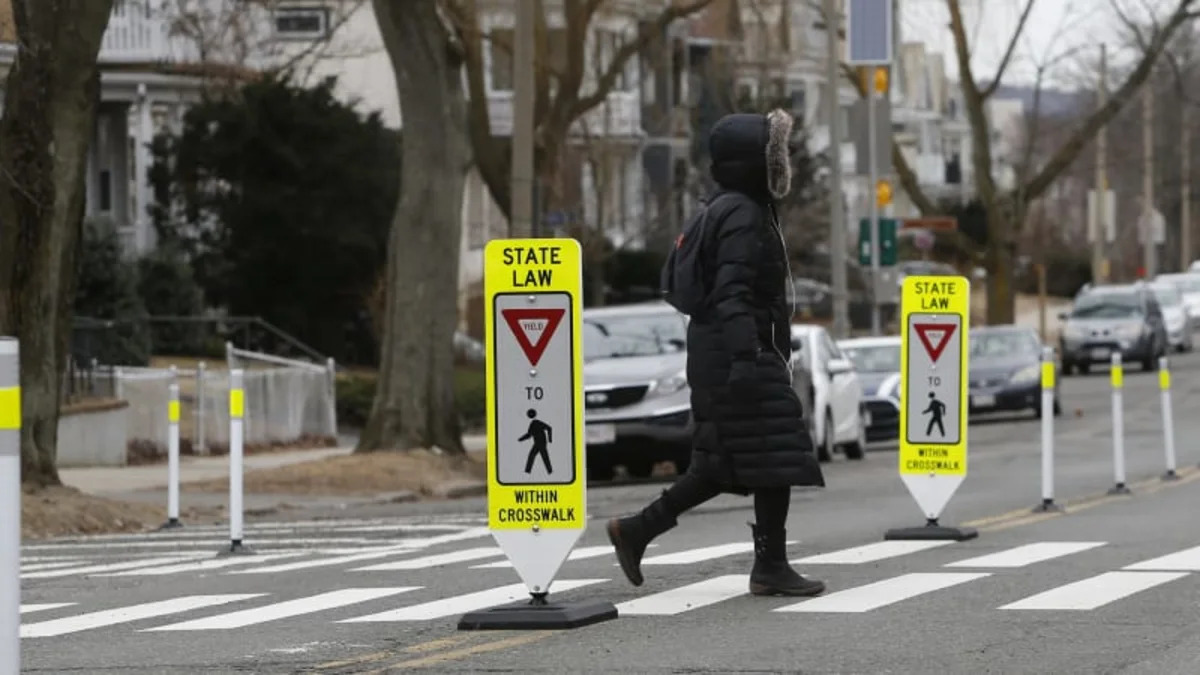New estimates from the National Safety Council suggest that the number of people killed in car crashes in 2018 in the U.S. declined slightly to 40,000. That's a leveling off after years of steadily rising numbers, but it represents the third consecutive year of at least 40,000 roadway deaths.
Seven states — Florida, Hawaii, Minnesota, Nevada, New Hampshire, Oregon and Pennsylvania — plus Washington, D.C., saw spikes in fatalities of at least 5.8 percent, according to the council. Five saw drops of more than 9.4 percent — Kansas, Maine, New Jersey, Rhode Island and Wyoming.
One cause for the high numbers is pedestrian fatalities. National Highway Traffic Safety Administration data show that pedestrian deaths have climbed 46 percent since bottoming out in 2009, with more than 12,000 pedestrians killed by vehicles in 2016 and 2017, the most recent years for which data are available. The Insurance Institute for Highway Safety last year issued a report saying that pedestrian crashes have become not only more common, but increasingly likely to result in death, especially when they involve sport utility vehicles or high-powered vehicles.
The IIHS last week released the results of its first round of new testing for automatic emergency braking systems in 11 small SUVs. Nine of them passed, meaning the systems helped the vehicles either stop completely or significantly slow down to mitigate the effects of a collision. Meanwhile, it rated the 2019 Mitsubishi Outlander as "Basic," while the 2018-19 BMW X1 flunked, despite the presence of BMW's Daytime Pedestrian Detection technology.
The National Safety Council offers several recommendations to make roads safer, including practicing defensive (and sober) driving, learning about your vehicle's safety technologies by visiting MyCarDoesWhat.org (or check out Autoblog's handy guide) and addressing recalls on your vehicle as soon as possible. We'll add our own: Leave your phone alone when you're behind the wheel. Is it really so hard?
Related Video:
Roughly 4.5 million people were seriously injured in crashes in 2018, a 1 percent decline from 2017. The 40,000 estimated fatalities last year was also down 1 percent from 2017, when there were 40,231 deaths, and represent a relative leveling off after several years of spikes, the organization says.
But the NSC notes that the number of deaths in 2018 is still 14 percent higher than it was four years ago, and while the organization doesn't ascribe causes, it says driver behavior is likely a major factor behind the high numbers. The National Safety Council collects fatality data every month from all 50 states and the District of Columbia and uses data from the national Center for Health Statistics to account for crash-related deaths that occur within a year after the crash.Seven states — Florida, Hawaii, Minnesota, Nevada, New Hampshire, Oregon and Pennsylvania — plus Washington, D.C., saw spikes in fatalities of at least 5.8 percent, according to the council. Five saw drops of more than 9.4 percent — Kansas, Maine, New Jersey, Rhode Island and Wyoming.
One cause for the high numbers is pedestrian fatalities. National Highway Traffic Safety Administration data show that pedestrian deaths have climbed 46 percent since bottoming out in 2009, with more than 12,000 pedestrians killed by vehicles in 2016 and 2017, the most recent years for which data are available. The Insurance Institute for Highway Safety last year issued a report saying that pedestrian crashes have become not only more common, but increasingly likely to result in death, especially when they involve sport utility vehicles or high-powered vehicles.
The IIHS last week released the results of its first round of new testing for automatic emergency braking systems in 11 small SUVs. Nine of them passed, meaning the systems helped the vehicles either stop completely or significantly slow down to mitigate the effects of a collision. Meanwhile, it rated the 2019 Mitsubishi Outlander as "Basic," while the 2018-19 BMW X1 flunked, despite the presence of BMW's Daytime Pedestrian Detection technology.
The National Safety Council offers several recommendations to make roads safer, including practicing defensive (and sober) driving, learning about your vehicle's safety technologies by visiting MyCarDoesWhat.org (or check out Autoblog's handy guide) and addressing recalls on your vehicle as soon as possible. We'll add our own: Leave your phone alone when you're behind the wheel. Is it really so hard?
Related Video:


Sign in to post
Please sign in to leave a comment.
Continue